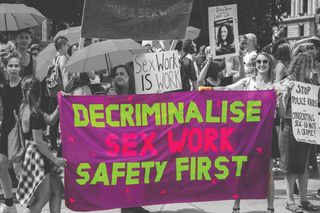
All The Arguments You Need: to Convince People Sex Work Should Be Decriminalized
Decriminalization helps make the sex work industry safer.

In our All The Arguments You Need series, we take on mindsets standing in the way of progress and rebut them with facts and logic.
Sex workers are one of the most stigmatized populations in society — and on top of it, are at higher risk for sexual violence, human trafficking, job insecurity, STIs, and incarceration. In a culture where sex is still taboo, the women who sell their bodies through sex are even more so. Recently and around the world, human rights activists are calling for sex work to be either decriminalized (not regarded as criminal activity) or legalized (subject to state regulation as to where and how it can operate). Some activists argue decriminalization is better than legalization since state intervention might make sex work even more difficult for marginalized groups within the sex worker community, such as drug users and undocumented immigrants. Regardless of efforts to decriminalize or legalize sex work, activists have faced severe opposition from moralists, conservative politicians, and law enforcement institutions. Here are the arguments those anti-decriminalization and/or anti-legalization pundits make, and why they are faulty:
Sex work is morally wrong.
Yes, it is — but not for the reasons you think. It’s not morally wrong to sell one’s bodies; models and athletes do it all the time and are celebrated and lauded for it. What’s morally wrong about sex work as it exists today is how the criminalization of sex workers makes their existence fraught with the threat of human rights violations. They’re at risk of being discriminated against, abused and even incarcerated by the police, and are at risk of exploitation and abuse from their employers and from their clients.
Sex work is a gateway to human trafficking.
Human trafficking “is an extreme form of labor exploitation where women, men, and children are recruited or obtained and then forced to labor against their will through force, fraud or coercion,” according to the American Civil Liberties Union. A common argument against the decriminalization of sex work is that it operates as a vehicle for human trafficking.
Any work that is forced to exist in the shadows, as sex work is, will be co-opted by criminals as a vehicle by which they grow their illicit businesses. The more sex work is thrust into the shadows, the more the industry and those within it become susceptible to human traffickers. Sex workers and others susceptible to human trafficking are “vulnerable because they often work in jobs that are hidden from the public view and unregulated by the government,” according to the ACLU. With decriminalization, the sex work industry gets more visibility and acceptance, which will reduce sex workers’ vulnerability to human trafficking. Right now, even if sex workers come across instances of human trafficking, they’re afraid to go to the police, since their own work is criminalized and they risk being arrested. If that stipulation is lifted, more sex workers could feel emboldened to trust law enforcement with their experiences, and have faith they won’t be persecuted for speaking up.
This, however, is a long way away. It’s not just legal bureaucracy that is preventing decriminalization; it is a deep-seated bias against sex workers, also held by the police — which would be much harder to tackle, decriminalization or not.
Related on The Swaddle:
New Revision to Anti-Trafficking Bill Doesn’t Account For Consensual Sex Work
Sex work is demeaning, unsafe, and renders sex workers voiceless.
First, let the sex workers decide if their work is demeaning to them. To exist in a reality very different from them and dictate what is or isn’t demeaning to a people is ignorant. As for the lack of safety — a war reporter is unsafe; a rugby player is unsafe; a police officer is unsafe. We don’t advocate against other unsafe professions for their lack of safety; we try to enact policies that make them safer. So, why should sex work be any different?
As for rendering sex workers voiceless, it isn’t the work that is doing so; it’s the policies that criminalize sex work that are leaving sex workers powerless in determining their own reality. In New Zealand, where sex work is decriminalized, for example, a Christchurch School of Medicine review found 90% of sex workers believed the law that decriminalized sex work gave them employment, and legal, health, and safety rights; 64% said they found it easier to refuse clients after decriminalization; 57% said they believed police attitudes toward them improved. With street sex work and brothels deemed not criminal, another sex worker was able to successfully prosecute a brothel for sexual harassment, according to Open Democracy.
Ultimately, decriminalization will help sex workers occupy more public spaces, enable them to speak up for themselves, and have a say in the laws that are created to govern their existence and work.
Sex workers spread sexually transmitted infections.
Sex workers are at a greater risk of contracting STIs, and in most cases, living with them, amid a lack of health policies targeted at their welfare. In India, for example, the National AIDS Control Organization (NACO) started a condom distribution program aimed at sex workers in 2008 — a move that was widely criticized by advocacy groups as a band-aid solution that didn’t make available sexual health information to sex workers. The need of the hour is to make health insurance available to sex workers, to educate them about safe sex practices — and to decriminalize their workplaces so they can publicly ask for these social benefits.
In places where sex work has been decriminalized or legalized, the instances of STIs decreased. In Rhode Island, U.S., sex work was decriminalized from 2003 to 2009 — during that period, “the state saw a large decrease in rapes and a large reduction in gonorrhea incidence for men and women,” according to a UCLA study.
Related on The Swaddle:
‘From Durban to Tomorrow’ Shows the Fight Against HIV is Far From Over
In another U.S. state, Nevada, sex work is legal in certain counties, where legal brothels operate; reports have found the sex workers at these establishments get routine check-ups to test for STIs, and are required to do so weekly. Use of condoms is also mandatory in Nevada’s brothels, both for oral and penetrative sex. “Since 1986, no full-time commercial sex worker has been tested positive for HIV,” a Business Insider report stated.
With legalization, not only does sex work get protected, it also gets regulated — so any customer walking into a brothel knows their experience will be a safe and healthy one. But legalization might also not be the best way forward for sex workers, with activists preferring the more inclusive decriminalization.
Decriminalizing sex work will increase the sex worker population in the region.
No, it won’t. A study comparing the sex worker populations before and after decriminalization in New Zealand showed the Prostitution Reform Act — through which policymakers decriminalized sex work — “had little impact on the number of people working in the sex industry,” according to a Christchurch University study. But, even if it did, so what? It would mean more people have a chance at gainful employment, in an industry that’s protected and will give them a fair livelihood. Right now, the presence of sex workers in a neighborhood is conflated with run-down brothels, other criminal activity and drug use, which is why people in gentrified neighborhoods don’t want sex workers in their proximity: the social capital of the neighborhood would go down. But guess what enables shoddy working conditions for sex workers? Criminalization of sex work. Once it’s decriminalized, sex workers will be able to choose where they work, and be able to gain access to clean, safe, and healthy working spaces — as people working in any other profession.
In India, the reality of sex workers exists as a paradox: sex work is legal, but any institution employing sex workers is not. Sex workers can charge for sex, but cannot solicit sex on street corners or run brothels. Combined with the stigmatization, lack of healthcare, conflation with human trafficking, and the otherization that sex workers face, a superficial ‘legal’ stamp on their profession serves to do next to nothing. Only by listening to and respecting the needs of the community can a decriminalization framework be adapted — one that gives a legal, official voice to a community that has fought in the margins for their rights for decades.
Rajvi Desai is The Swaddle's Culture Editor. After graduating from NYU as a Journalism and Politics major, she covered breaking news and politics in New York City, and dabbled in design and entertainment journalism. Back in the homeland, she's interested in tackling beauty, sports, politics and human rights in her gender-focused writing, while also co-managing The Swaddle Team's podcast, Respectfully Disagree.
Related


What We Know as Emotional Labor Is Often Not What It Means at All
